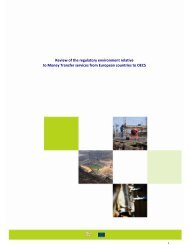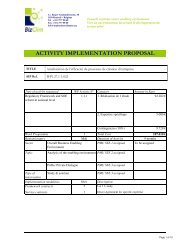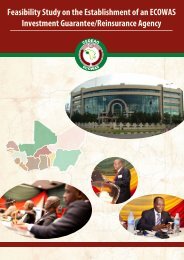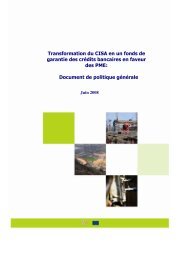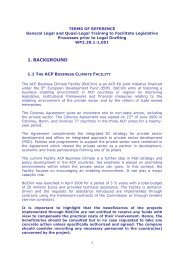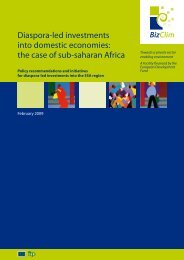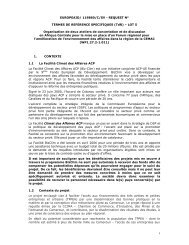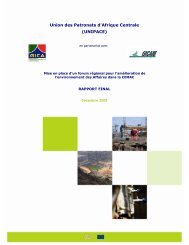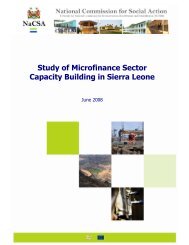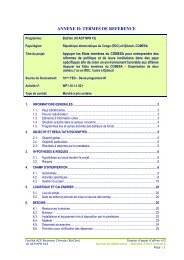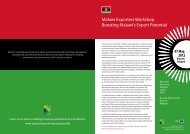BizClim, a new ACP-EU Facility - ACP Business Climate
BizClim, a new ACP-EU Facility - ACP Business Climate
BizClim, a new ACP-EU Facility - ACP Business Climate
You also want an ePaper? Increase the reach of your titles
YUMPU automatically turns print PDFs into web optimized ePapers that Google loves.
Dossier❯Undertaking of studiesand interventions<strong>BizClim</strong> provides technical assistance inorder to improve regulations, legislation,the institutional set up, and financialmeasures (the rules of the game) relatingto the enabling environment of the privatesector in <strong>ACP</strong> countries and regions andin the Manual of Policies and OperatingProcedures (MPOP), and finalized by thePMU. The <strong>Facility</strong> caters primarily to privatesector organisations, governments andgovernmental agencies and regionalorganisations.A wider role as a think-tank<strong>BizClim</strong> may as well implement activitiesrequested by the <strong>ACP</strong> Group, the EuropeanInvestment Bank (EIB), the EuropeanCommission and its Delegations. Itundertakes activities that are consistentwith its think-tank role in pertinent areassuch as public private partnerships, SOEreforms and privatisation, as well as povertyreduction policies and strategies.<strong>BizClim</strong> provides assistanceto <strong>ACP</strong> countries and regionsfor improving their businessclimate and boostinginvestment prospects.Four Types of Activitiesin order to reform the SOEs. To this effect,it supports the undertaking of upstreamstudies and interventions, includingcapacity building and public-privatedialogue.A demand-driven <strong>Facility</strong><strong>BizClim</strong> operates on a demand-driven basiswith applications for assistance introducedby eligible beneficiaries. Requests arescreened on the basis of criteria set out<strong>BizClim</strong> is a further step in the integrated ECstrategy to private sector development andpolicy development in the <strong>ACP</strong> countries:it promotes environments within whichthe private sector can grow and, thus, canplay a major catalytic role. The CotonouAgreement gives an important role to Non-State Actors, including the private sector,and stresses the need to unite all economicand social actors behind the common goalof attaining the sustainable developmentof the <strong>ACP</strong> States. These are challengedby a variety of old problems as well as<strong>new</strong> ones stemming from the evolvinginternational environment, such as theerosion of preferences. It is only necessaryto see the ranking of <strong>ACP</strong> countries inthe competitiveness stakes to realize thatconcerted action is needed to improve thebusiness climate.Co-operation with other donors<strong>BizClim</strong> undertakes four main categories of activities:n Upstream studies and interventions on the enabling environment and StateOwned Enterprises reform, identifying the specific bottlenecks hampering privatesector development, the reforms needed and the way to implement them;n Studies in investment prospects and financial system development, notably toexpand the European Investment Bank portfolio in <strong>ACP</strong> countries (i.e. upstreamfacilitation of operations funded by the Investment <strong>Facility</strong> and of PPPs);An amount of € 2 million is dedicated toco-financing two World Bank Trust Funds,namely the Public Private InfrastructureAdvisory <strong>Facility</strong> (PPIAF) and theKnowledge for Change Programme (KCP).<strong>BizClim</strong> ensures follow-up andco-ordination with these programmesand integrates their results in its ownactivities. nn Support in the follow-up of recommendations;n Capacity to develop and disseminate analyses of relevant and topical themes.2 BizNEWS n°1 n October-December 2006



